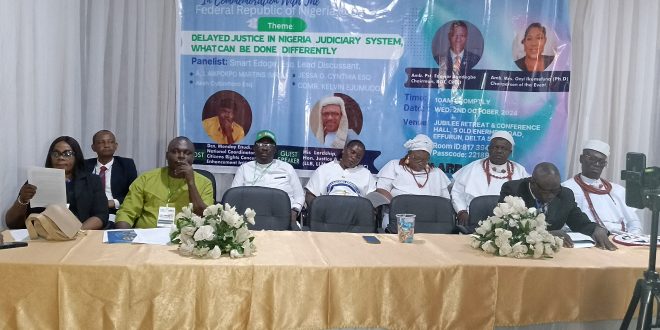By Chuks Peter, DELTA |
Nigeria marked its 64th Independence Anniversary, reflecting on its journey since breaking free from colonial rule. During this celebration, Honourable Justice Anthony Olotu Akpovi of the Delta State High Court delivered a compelling lecture at the Jubilee Retreat & Conference Centre, highlighting the critical issue of delayed justice within Nigeria’s judicial system.
Justice Akpovi on Wednesday afternoon, began his address by questioning the common perception of Nigeria’s age, noting that the name “Nigeria” was first coined in 1897. He elaborated on the evolution of the nation’s judicial framework, tracing its roots from the establishment of courts in the 18th century to the founding of the Supreme Court in 1963. This historical context was essential for understanding the intricate challenges the current judicial landscape faces today.
He emphasized that justice is often misconstrued; it is not merely about retribution but embodies fairness and equality. “True justice must be about balance,” he asserted, stressing that the judicial process must protect the rights of victims, defendants, and society at large.
Central to Justice Akpovi’s discussion was the difference between perceived delays and the realities of the judicial system. He shared a cautionary tale about the dangers of “instant justice,” where individuals face wrongful punishment without due process. He said, “Justice is a three-way traffic,” he quoted the late Justice Chukwudifu Oputa, emphasizing the need for due process and careful adjudication.
Justice Akpovi acknowledged the significant delays within the system, attributing them to various systemic issues, notably the severe shortage of judges. He pointed out that there is approximately one judge for every 100,000 Nigerians, resulting in a growing backlog of cases and leaving many citizens in limbo regarding their legal disputes.
Another factor contributing to delays is the heavy reliance on litigation as the main avenue for conflict resolution. Many Nigerians, whether due to ignorance or fear, often settle disputes outside the courts, further exacerbating the backlog. “We need to educate our citizens about their legal rights,” Justice Akpovi urged, advocating for greater awareness of the judicial system’s remedies.
Infrastructure inadequacies also hinder court efficiency. Justice Akpovi lamented the lack of modern facilities, noting that many court proceedings are recorded manually, which leads to significant delays. “Without proper infrastructure, judges cannot perform optimally,” he stated, pointing out that the physical environment affects the entire judicial process.
External factors, including insecurity and health crises, further disrupt court operations. Justice Akpovi recounted instances where courts were forced to relocate due to safety concerns, greatly impacting the administration of justice. He also mentioned how strikes by judicial staff halt proceedings, extending the timeline for case resolution.
In closing, Justice Akpovi called for a comprehensive approach to tackle the challenges of delayed justice in Nigeria. He advocated for increasing the number of judges, enhancing training for court personnel, and expanding alternative dispute resolution mechanisms.
Additionally, he highlighted the necessity for investing in court infrastructure. As Nigeria forges ahead on its post-independence journey, addressing these judicial issues will be vital to ensuring that justice becomes a tangible reality for all citizens.



